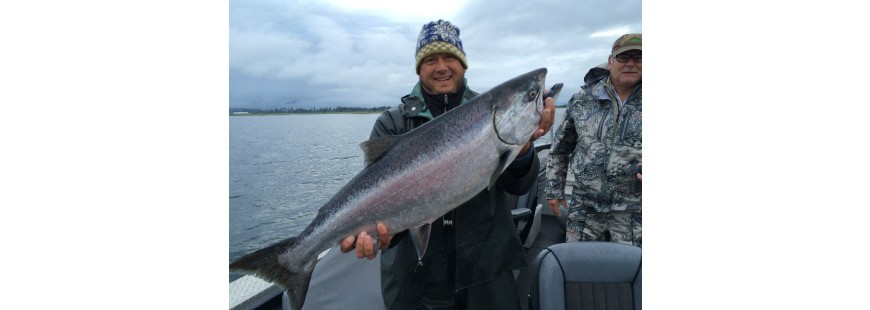Photo: York Johnson with a 23-pound Tillamook Bay hatchery spring Chinook.
I, maybe too often, tout myself as a proud sixth-generation Oregonian, deeply invested in the health and well-being of Oregon’s natural resources. Some would say I advocate for fish and wildlife for selfish reasons; I fish and I hunt. Call me greedy, my opponents do; I want more fish and game in Oregon’s waters and on our landscape.
The reality is, however, I’ve spent countless months off the water, lost tens of thousands of dollars in revenue and let hundreds, if not thousands, of delicious salmon, steelhead and sturgeon go because of conservation measures needed to protect sensitive stocks of fish. It’s not only the law, but it’s the right thing to do. I’ve always been proud that Oregonians are willing to sit on the sidelines to ensure the next generation of fish can be spawned. While we humans have done our damage, it was largely due to the ignorance of the ecological needs of what these iconic species need to thrive, not due to sport angler greed.
We can’t use that excuse any longer; we have enough science to tell us what we’re doing wrong and what we need to do right in order to recover our diminishing stocks of fish. It’s pushing the needle far enough, against established policy, to make the change. I’ve cited the Salmon 2100 project before, which details the extent to which we need to move the needle to save salmon from just a remnant population by the year 2100. It’s pretty alarming news, and given the muscle memory our society has, along with its persistent needs for non-renewable energy and the thirst to develop land, I can’t say I’m all that optimistic. I’m grateful that I won’t be fishing in the year 2100.
So why is it here in “The Beaver State” that, despite lots of leeway, Oregon just got a $1.2 million dollar check pulled out from under us, to do restoration and enhancement work in our wetlands because we couldn’t get our act together to slow down coastal pollution in our coastal waterways? To quote the article, “The decision makes Oregon the first state to face penalties for failing to meet federal standards set in 1990.” Yes, you read that right, 1990. Who here do you know, who gets 26 years to “get it right,” other than a mass murderer in a federal penitentiary? So proud right now….
Nobody likes regulation, but hunters and anglers likely face more regulation in harvesting than any other stakeholder in our watersheds. For an animal that’s on top of the food chain on so many levels, why are we on the bottom of the supply chain? Maybe it’s because we’re about as close to an end user as it gets.
It’s much, much easier to see the direct correlation to hook and line mortalities than it is the massive adult salmon kills we witnessed in the Pacific Northwest this summer. And how about the juveniles? It’s much easier to see dead, bloated and floating adult salmon versus the three to six inch baby salmon that fell victim to last summer’s lethal summer temperatures. And pollution, such as the pesticide use in our watersheds that bio-accumulate over time? Too hard to model, we’ll be told.
And we have it good here in the United States, or at least that’s what I’m told to believe. There is an incredible amount of regulation that happens for our natural resource extractors, not just us. Regulation that was considered cutting edge way back in 1971, called The Forest Practices Act is obviously outdated if Oregon just got fined $1.2 million dollars for not coming into compliance for the last 26 years…. After all, what harm can runoff from old logging roads, logging slide-prone hillsides and aerial spraying near stream banks really do?
And here’s a good one, Richard Whitman, Governor Brown’s natural resource advisor, told the Oregonian that, “the state plans to address remaining concerns through voluntary measures.” Man, what a Pandora’s Box that opens up! How do you think I would do with “voluntary measures” if I had a choice to release or retain, a twenty-five pound wild spring Chinook salmon that’s worth over $40/lb.? I’m afraid I’d have to voluntarily invite it over for dinner, and I’m a conservationist!
As one that adheres to all fishing regulations, at least to my knowledge, sometimes angler’s choice isn’t the right choice. I hope for salmon that there is a day when sport anglers can work more closely with environmentalists to achieve a goal we all want for our Oregon. Our oceans have sound regulation and our fishermen have sound regulation. If we plan to have wild salmon and steelhead for future generations to enjoy, I know we’re not going to get there with voluntary measures.


